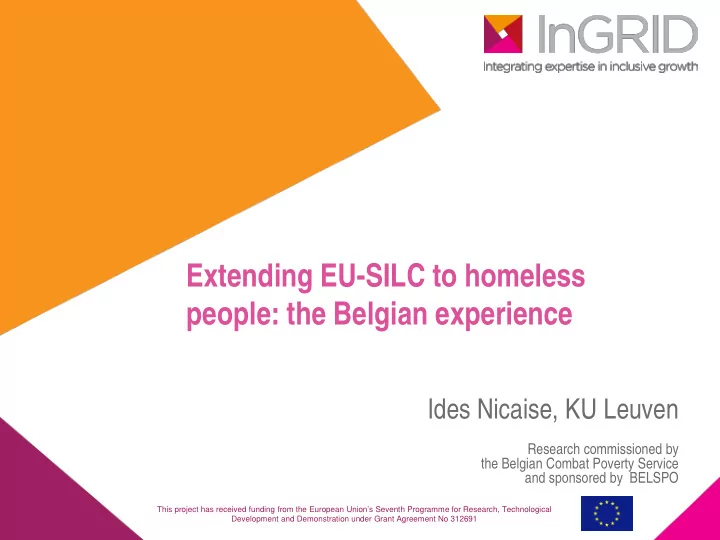

Extending EU-SILC to homeless people: the Belgian experience Ides Nicaise, KU Leuven Research commissioned by the Belgian Combat Poverty Service and sponsored by BELSPO This project has received funding from the European Union’s Seventh Programme for Research, Technological Development and Demonstration under Grant Agreement No 312691
Homeless people as a H2S group in EU-SILC Why homeless people ? (several H2S groups identified) • ‘obscurity’ • Size of the group • Extreme poverty Why a ‘statistical survey’ ? • Estimation of bias in poverty rates based on EU-SILC • Comparison of statistical profile with other groups • Possibility of international comparison • Monitoring of living conditions across time 30-5-2016 www.inclusivegrowth.be 2
Homeless people as a H2S group • Hard-to-sample: absence of (direct) sampling framework • (Hard-to-identify: ETHOS typology) • (Hard-to-contact: not really) • (Hard-to-persuade: no – rather ‘gatekeepers’) • Hard-to-interview: – Low literacy – mental illness / disorders – complexity of living conditions (different interpretations of basic concepts: household, work, income, …) www.inclusivegrowth.be 3
Overall strategy of the survey • Indirect (two-stage) sampling in collaboration with social services and advocacy groups • Adapted questionnaire design • Close monitoring of interviewers (carried out by specialised survey team) • Preliminary statistical analysis of data • Feedback to intermediaries and policy makers 30-5-2016 www.inclusivegrowth.be 4
Sampling and response • Sample stratified by region, gender and age group based on available (scarce) information • Extensive negotiation with intermediaries from social services (= gatekeepers) • Compromises between scientific and pragmatic criteria (e.g. mental health issues, peer pressure…) • Snowball method rather ineffective • Remaining response bias unavoidable 30-5-2016 www.inclusivegrowth.be 5
Selectieve (non-)respons - DTL Strata and response (target 250 / reached 275) Flanders Brussels Wallonia 91 /141 71 / 68 88 / 68 Male Female Male Female Male Female 61 / 89 30 /52 57 /41 14 / 27 64 / 38 24 / 30 Roofless Homeless Roofless Homeless Roofless Homeless 13 / 19 78 / 122 11/19 60 / 49 13 / 26 75 / 42 < 30 30-50 >50 < 30 30-50 >50. < 30 30-50 >50 47 / 50 31 / 66 13 / 21 30 / 15 29 / 37 12 / 16 37 / 17 36 / 39 15/10 www.inclusivegrowth.be
Some key findings • High AROP rates (72%) => Lack of effectiveness of guaranteed minimum income and social assistance scheme => surprises: e.g. one home-owner • Deprivation rates = 100% – with extreme hardship among rough sleepers (no access to potable water, toilet or shower in their place of residence) • High proportions of women with children (32%) 30-5-2016 www.inclusivegrowth.be 7
Some key findings (ctd) • Severe health problems (24%). Mainly nervous / psychological distress (lack of sleep, anxiety, loneliness, addiction…). Non-use of medical services for financial reasons 30-5-2016 www.inclusivegrowth.be 8
NICAISE I., SCHOCKAERT I., The hard-to-reach among the poor in Europe: lessons from Eurostat's EU-SILC survey in Belgium, in TOURANGEAU R. EDWARDS B., JOHNSON T., WOLTER K., BATES N. (eds., 2014), Hard-to- survey populations , Cambridge University Press, p.1246-1279 See also session on EU-SILC Thursday afternoon Co-ordinator Guy Van Gyes Monique Ramioul InGRID Inclusive Growth Research Infrastructure Diffusion Partners Contract No 312691 TÁRKI Social Research Institute Inc. (HU) For further information about the InGRID project, please contact Amsterdam Institute for Advanced labour Studies, Universiteit van Amsterdam (NL) inclusive.growth@kuleuven.be The Swedish Institute for Social Research, Stockholms Universitet (SE) www.inclusivegrowth.be Fachbereich IV, Wirtschafts- und Sozialstatistik, Universität Trier (DE) p/a HIVA – Research Institute Centre d’Etudis Demogràfics, Campus de la Universitat Autònoma de Barcelona (ES) for Work and Society Centre d’Etudes de Population, de Pauvreté et de Politiques Socio-Economiques (LU) Parkstraat 47 box 5300 Centre for Social Policy, Universiteit Antwerpen (BE) 3000 Leuven Institute for Social & Economic Research, University of Essex (UK) Belgium Bremen International Graduate School of Social Sciences, Universität Bremen (DE) Department of Dynamics of Organisations of Work, Centre d’Etudes de l’Emploi (FR) The Centre for European Policy Studies (BE) Dipartimento di Economica e Menagement, Università di Pisa (IT) Social Statistics Division, University of Southampton (UK) Luxembourg Income Study, asbl (LU) WageIndicator Foundation (NL) School of Social Sciences, The University of Manchester (UK)
Recommend
More recommend